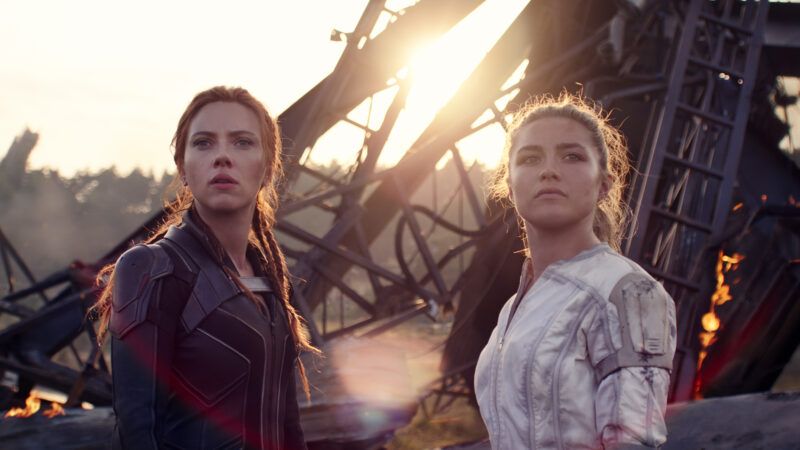Review: Black Widow
Scarlett Johansson and Florence Pugh lead Marvel into a new age.

You knew it would come to this. After a decade of patiently enduring her female fate—waiting around to be granted her own standalone movie while one male Avenger after another got his (Captain America, Thor, Iron Man, Iron Man, Iron Man, even Ant-Man, for God's sake)—Scarlett Johansson's Natasha Romanoff finally gets the call. But it's too late—in the Avengers timeline, Natasha is dead. And it wasn't much of a death, either: In the 2019 Avengers: Endgame she fell from a cliff and got one farewell shot as a corpse before the story moved right along.
Endgame was the last hurrah for the original Avengers, but of course no one at Marvel/Disney was ever about to let this cash geyser stop gushing. So a narrative cheat had been devised: The next movie would be set in 2016, a year in which Natasha was still alive. As you'll surely recall, that was the year of Captain America: Civil War, in which the Cap and Tony Stark/Iron Man had a big falling out and Natasha disappeared.
Now—in 2016, that is—we find Natasha on the run in Europe (the movie globe-trots expensively from Norway and Hungary to Morocco and England and beyond). She has to cool her heels for a bit, though, while the story flashes us back to 1995 Ohio to meet two little girls—preteen Natasha and her younger sister Yelena—who are living happily with their immigrant parents Alexei (David Harbour) and Melina (Rachel Weisz). Then disaster strikes, in the form of a S.H.I.E.L.D. snatch team. It turns out the parents aren't really parents and the sisters aren't really sisters, either—they're all part of a sleeper cell of KGB spies (even though in the real-world, Russia had disbanded the KGB in 1991). Alexei—once a Soviet superhero called Red Guardian—is tossed into prison; Melina is consigned to a hog farm (long story); and Natasha and Yelena are shipped off to the Red Room, a most unpleasant spy-training school dedicated to turning young girls into deadly assassins, or "black widows."
As you might now guess, Black Widow, directed by Australian filmmaker Cate Shortland, is not a standard-issue Avengers offering. It's actually about Natasha reuniting her sundered family: breaking Dad out of prison, liberating Mom from the pig place, and trying to track down Yelena. Which is to say, the movie has quite a bit of heart, and even a few quiet moments (although they don't last long). It also gives Johansson more room than usual to demonstrate her under-heralded skill as an actor—something previously on view in such films as Marriage Story, Jojo Rabbit, and Vicky Cristina Barcelona. She can light up a scene with a well-timed glance and a melancholy smile, and her subtle technique is fascinating to watch.
The movie's central figure, though, is the exceptional Florence Pugh (Midsommar), who plays Natasha's semi-sister Yelena with a Russian accent as thick as a gob of sour cream—and makes it work. Yelena is full of wisecracking spunk (the scene in which she ribs Natasha about her hair-flipping battle pose is all the funnier for being so casually offhand), and we quickly realize that she's on hand to take up the Avengers torch from Natasha and inaugurate a new phase of the franchise. Pugh, with her non-glam looks and no-nonsense presence, is an excellent choice for this assignment.
Despite its embrace of family and feelings, Black Widow is very much an action movie—or, more specifically, a slam-bang international spy film. With its cobbled Euro courtyards and hell-bent car-chase scenes, it strongly resembles a Bourne movie, and its mile-high Red Room headquarters is an echo of the Alpine Blofeld lair in the long-ago Bond film On Her Majesty's Secret Service. Some of the film's action choreography will surely become iconic, like the scene in which we see Natasha leaping off a prison catwalk to grab onto a cable dangling from an escape helicopter choppering by overhead. (Sure it's mostly CGI, but it's really well-done CGI.) There's also an effectively menacing villain dogging the two women's footsteps as they track down some sort of mind-control stuff (long story number two), a hooded, metal-faced figure called Taskmaster.
There are a few things in the movie that don't work, of course. Ray Winstone, cast as the Red Room master Dreykov, is too matey an actor to be very unnerving—especially when he gets some of the script's lamest dialogue (going all woke with "The only natural resource the world has too much of [is] girls" and addressing a group of his assassins who've found a new victim with, "Make her suffer!"). And the movie's inevitable collapse into a blizzard of digital clutter at the end is even more dispiriting now, in this supposedly new Marvel age, than it was before.
But Johansson and Pugh are a top-drawer team, and Pugh, continuing on her own, promises to be a freshening influence on the 13-year-old Marvel superhero universe, and a good reason to stay tuned.


Show Comments (36)